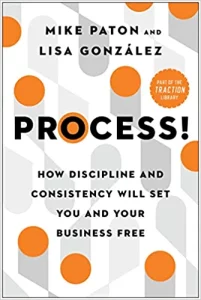Chapter 2 – Why is Process Important? page 19.
What Is A Strong Process Component?
- Definition: A Process is a set of actions or operations that achieves a desired result.
- A strong process component is about getting the most important things in your organization done the right and best way every time.
- “Franchise Prototype: A proprietary way of doing business that successfully and preferentially differentiates every extraordinary business from every one of its competitors.” – Michael E. Gerber, The E-Myth Revisited
The Benefits
1. You’ll grow faster (and more sustainably)
- When your marketing and sales processes are documented, simplified, and followed by all you will generate more leads and increase your win rate.
- Also, your process discipline will help you retain and grow existing relationships.
2. You’ll attract and keep better talent
- Strengthening your people processes will help your company get better at sourcing, recruiting, interviewing, hiring, onboarding, training, growing, celebrating, and rewarding your employees.
3. You’ll engage everyone in a culture of excellence
- Without a strong Process Component, each person will learn their own ways of getting things done.
- The failure to proactively document best practices creates inconsistencies that get embedded in the system.
- Before we document our best practices, people are always reinventing the wheel.
- When processes are documented, an organization can expect consistency of action, predictability of outcomes, and a foundation from which you can consistently improve each process.
4. Your customer will be happier
- Core Marketing & Sales Processes create a consistent set of realistic expectations in the marketplace.
- Core Operations Processes will help you consistently deliver high-quality products and great services.
- Consistently meeting (and exceeding) customer expectations will help you build a strong brand.
- A Customer Satisfaction Core Process will help you better understand the needs of your customer, and determine if those needs are being met.
5. You’ll have more time
- Documented Core Processes help new employees get up to speed and begin contributing much faster.
- Managers spend less time answering basic questions and can spend their precious time coaching, mentoring, developing people, and improving processes.
- Leaders will have more time to innovate, think, strategize, plan, and lead.
6. You’ll get better at resolving issues
- Having an agreed-upon way of doing things in your business will help you more quickly and accurately determine why you’re not getting the results you want.
- When your team is not performing as expected, the first place to look is your processes.
7. You’ll make more money
- More effective
- Fewer mistakes (and waste)
- More efficient
- Less fire-fighting
- Less regrettable turn-over
- Better employee and customer retention
8. Your company will become more valuable
- Documented Core Processes can have an exponential impact on the value of your business.
- “If your people depend on people and not on process, your business does not have any value.” Michael Gerber, E-Myth Revisited
- Put simply, what makes a business valuable is its ability to generate consistently excellent results without relying on the founder or a small group of experienced team members.
9. You’ll live a better life
- When processes aren’t documented, even small issues may require an owner’s daily involvement, causing them to miss time with family, friends, and their favorite extra-curricular activities.
- When your organization is a well-oiled machine and no longer needs your day-to-day firefighting, you’ll have the time, energy, and financial resources to pursue other passions.
The Costs
1. You will struggle to find and keep good people
- Without a proven approach to finding, recruiting, and evaluating world-class candidates, winning the battle for the best people is nearly impossible.
- Does your company have a carefully designed process for leading and managing its great people? Are your team leaders, supervisors, and managers properly trained? Or are your employees at the mercy of the individual capabilities of each unique boss?
- Direct Costs: According to SHRM, companies spend 50-75% percent of an employee’s annual salary to recruit and train someone new
- Indirect Costs: A business that is understaffed or full of new, inexperienced people is far less likely to meet growth goals, ship quality products on time, or deliver the service that meets the customer’s expectations.
2. Your business will stop growing
- Inconsistent execution in just about any area can halt growth.
- Without a Core Marketing Process, many companies struggle with reaching the right prospects, differentiating themselves from the competition, and generating qualified leads.
- Without a Core Sales Process, it’s difficult for organizations to consistently win new business, build strong relationships, grow accounts over time, and/or get customer referrals.
- Without a set of Core Operations Processes, it’s nearly impossible to keep those hard-earned customers happy beyond the sale.
- Without a Core Finance Process, it is difficult to keep the business financially healthy.
3. Your business will fall behind and/or become obsolete
- Being strong in the Process Component means regularly reviewing, updating, and improving the way the most important things are done.
- Left unchecked, failing to observe long-held processes with a critical eye and make improvements as the world around you changes can put you out of business.
- When an organization is dependent on people – not process – and tries to grow by adding products, services, locations, or just more people and customers, chaos ensues.



